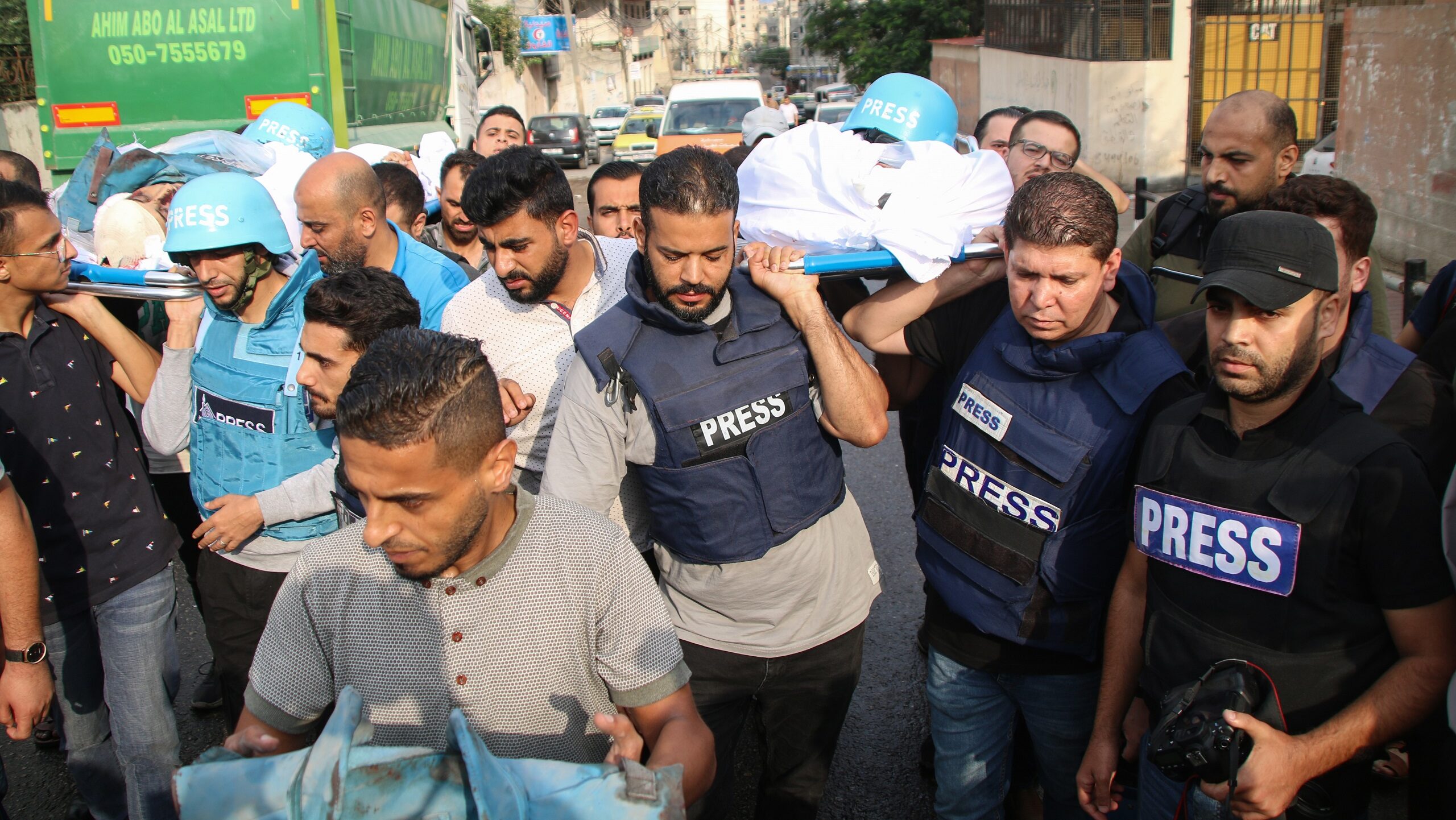Pens on the Frontline: Journalists Reporting From Gaza
Gaza journalists share the tragic realities faced by civilians during escalating war
As the Israel-Hamas war continues to escalate, Gazan journalists stand at the front lines witnessing firsthand the struggles of the people in Gaza.
According to the Hamas-run Palestinian Ministry of Health, since October 7, over 6,600 Palestinians in the West Bank and Gaza have been killed, and 19,000 have been injured.
The war has led to a loss of many residential units, a significant scarcity of food, water, fuel, and medical supplies, and a lack of safety as far as places to seek refuge go.
With sporadic internet connection and rationed electricity in Gaza, it is difficult to reach journalists who could share the events as they were happening.
Three different journalists from Gaza were contacted via WhatsApp and were asked to answer a series of questions through voice notes regarding the current conditions in Gaza.
Bread and other nutritional foods are beginning to be in short supply in Gaza, and because the people from the north of Gaza have come down to the south, crowds there have increased despite the lack of groceries. So there are a lot of people who go a full day without basic food items to survive on.
Tareq Hajjaj, a resident of Gaza who works for the Mondoweiss news website, which is highly critical of Israel. Hajjaj explained to The Media Line that the food scarcity in Gaza is continuing to increase, putting many civilians at risk.
“Bread and other nutritional foods are beginning to be in short supply in Gaza, and because the people from the north of Gaza have come down to the south, crowds there have increased despite the lack of groceries. So there are a lot of people who go a full day without basic food items to survive on,” he states.
Gaza needs around 462 truckloads a day, and they allowed only 20 to enter, which is ridiculous
The Rafah border crossing between Egypt and Gaza, opened on October 21, allowed humanitarian aid to finally reach civilians. China Global Television Network reporter from Gaza, Akram al-Satarri, describes, though, how the 20 truckloads were not enough.
“Gaza needs around 462 truckloads a day, and they allowed only 20 to enter, which is ridiculous,” he says.
Despite the lack of trucks being allowed entry into Gaza, al-Satarri continued to describe the assistance of other relatives, nations, and organizations around the globe trying to aid the civilians of Gaza.
“Gazans have been receiving individual support from relatives, other Arab countries, and in Europe as well. In the streets of Gaza, you will see money exchange businesses, like MoneyGram, or other Western Union-type places. All these people are waiting in lines to cash out money that was sent to them. Also, at the level of organizations, from different parts of the world, including the USA, Europe, Canada, and the UK, they have also been providing some of the supplies in Gaza, and have been distributing them,” he mentions.
When it comes to seeking refuge, the interviewed journalists claimed that there is no place considered safe—every place can potentially be struck.
Most of the people in Gaza are either trying to stay with relatives located in the south of Gaza or seek refuge in the schools that were funded and given by UNRWA. … A lot of these people who fled their homes for safety don’t even know if their homes have been targeted.
Gaza journalist Sabrina Al Boji, who works for the Gaza Post, explained that all those who have had to flee their homes from the north to the south are struggling to find a safe place to live.
“Most of the people in Gaza are either trying to stay with relatives located in the south of Gaza or seek refuge in the schools that were funded and given by UNRWA [the UN Relief and Works Agency]. … A lot of these people who fled their homes for safety don’t even know if their homes have been targeted,” she emphasized.
Al-Satarri echoes this by claiming that some people had to stay in the streets if they did not have any relatives housed in buildings.
“The ones who were not lucky enough to find someone to host them are staying in open areas or in the streets. Some people that I saw were sleeping in their cars on the road because they didn’t find anyone to host them.”
Hajjaj shares his personal experience since the start of the war in which he now lives in a home that isn’t his. “There is no privacy in this home, and my family and I are sleeping on the floor,” he said.
In addition to the difficulty of reaching reporters, more than a dozen Gaza journalists have reportedly been killed during the war.
Ibrahim Sourani, a project coordinator for the United Nations Development Programme, who works with the Palestinian Authority, shared a post on Facebook mentioning the recent death of Gazan film director Roshdi Sarraj.
He wrote, “Roshdi Sarraj left us today. Roshdi [was] among the few talented film directors in Gaza. He was the voice of the voiceless. So committed, so professional, so polite. Whatever I would write, I could not repay his noble efforts for people. My heart is heavily crying for him, yet we are sure he is in a better place.”
Lana Ikelan is a recent graduate of the Hebrew University of Jerusalem and an intern in The Media Line’s Press and Policy Student Program.


